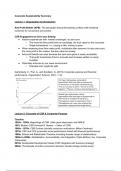Corporate Sustainability Summary
Lecture 1: Organization & Introduction
Anti Profit Beliefs (APB): The perception that profit-seeking conflicts with beneficial
outcomes for consumers and society.
CSR Engagement as Zero-sum Setting
● Intuitive experiences with ‘market exchanges’ as zero sum:
○ The more the firm profits form an exchange, the less value for the consumer
○ Single transactions: i.e., buying a bike, money is gone
● When assessing how firms make profit, individuals often assume it is also zero-sum:
the more profit a firm makes, the less value for society
● Anti-profit beliefs can arise because the zero-sum game is easily accessible
○ That profit incentivizes firms to innovate and increase welfare is nearly
invisible!
● Potentially enforces by our news environment:
○ Scandals sell, negativity sells
Gartenberg, C., Prat, A., and Serafeim, G. (2019). Corporate purpose and financial
performance. Organization Science, 30(1), 1-18.
Lecture 2: Concepts of CSR & Corporate Purpose
Timeline
1920s - 1950s: Beginnings of CSR (after great depression and WW II)
1953: Modern CSR (Howard R. Bowen → father of CSR)
1960s - 1970s: CSR Evolves (socially conscious motivations. Milton Friedman)
1970s: CSP and CFS (corporate social performance linked with financial performance)
1980s: Ethical and Stakeholder Theories (including broader range of stakeholders)
1990s to 2000s: Globalization, Accountability, and Integration (Triple Bottom Line, Corporate
Citizenship)
2010s: Sustainable Development Goals (CSR integrated with business strategy)
2020s: The Decade of Action (consumer demand, climate change central issue)
,Corporate Social Responsibility (CSR)
CSR can include: employee welfare, community programs, charitable donations,
environmental protection.
Related concepts and synonyms: Sustainability, corporate citizenship, philanthropy, ESG,
Stakeholder engagement, Triple Bottom Line
Terms and definitions
Many dimensions of sustainability:
● Stakeholder perspective
● Economic dimensions, environmental dimension, social dimension
● Voluntariness dimensions
● Business Horizon & Intergenerational dimension
● Impact vs exposure perspective
Corporate Citizenship
Companies are responsible for contributing
to the communities in which they operate,
including environmental stewardship and
social responsibility. Companies must
comply with laws and regulations and pay
taxes. Governments provide the legal
foundations.
The Pyramid of CSR
Tension:
● Resources spend on legal, ethical or
philanthropic purpose detract from
profitability
● Ordering of stakeholder priorities
Triple Bottom Line (TBL)
Management concept that aims to measure the
financial, social and environmental performance of
the corporation. Only a company that produces a
TBL is taking account of the full cost involved in
doing business
,Goal
● Manage economic - not just financial value added / destroyed
● Provoke to rethink capitalism
Recall:
● One of many frameworks, not just accounting tool
● Unclear whether TBL aggregation and analysis helps decision-takers and policy
makers to track impact
Who should provide activities for sustainable development?
Arguments to consider:
● Conflicts regarding “business purpose”
● Intrinsic motivation
● Competence / knowledge
● Potential impact
● Prevention or fixing of problematic outcomes
● Crowding out
Collaborative effort
● Legal framework, enforcement, infrastructure (Governments)
● Innovation, implementation, investments (Private sector)
● Awareness, expertise, research (Non-governmental organizations)
EU perspective
From a normative view: should companies engage in CSR activities and what decisions
should managers take regarding CSR?
, CSR: a business model (strategy) that affects organizational processes and company
culture.
Broad Societal and Environmental Focus: Goes beyond financial materiality to address
the wider effects of a company’s operations on society and the environment.
Value Creation: Looks at both positive and negative impacts, like community development
or environmental degradation, and how the company contributes to or mitigates these
impacts.
Stakeholder-Centric: Considers the interests and well-being of a broad set of stakeholders,
including local communities, employees, and the ecosystem.
Example: A company reports on how its water usage and conservation efforts affect local
communities' access to clean water.
ESG: a model used by investors to examine the sustainability of a company including a set
of (quantifiable) criteria.
Financial Materiality Focus: Highlights how environmental, social, and governance (ESG)
issues present risks and opportunities to the firm’s financial performance.
Risk Management: Involves identifying and reporting on ESG factors that could affect the
company's bottom line, such as regulatory risks, reputational risks, or operational risks.
Investor-Centric: Tailored to the information needs of investors who use ESG data to
assess potential financial impacts on their investments.
Example: A company discloses its carbon emissions in the context of potential carbon taxes
and their impact on profitability.
Corporate purpose - Question of accountability
● In the 1930s: Berle vs. Dodd Debate
● Berle’s shareholder primacy emphasizes managers (legal) fiduciary duty towards
shareholders
○ Investors invest their own funds into a firm.
○ Investors should get the returns that this money generates.
● Dodd views corporation as economic institution with a social service as well as a
profit-making function
○ Corporations embedded in society and environment (stakeholder theory)
○ Corporations profit from society and environment and need to give something
back
○ Corporations receive a license to operate from society (legitimacy theory)
○ Corporations’ actions’ impact societies beyond profit generation
(“externalities”)
Shareholder primacy view
Main principle
• Profit maximization
Argumentation
• Shareholders as company owners should decide what to do (to do good) with their share of
company profits.





